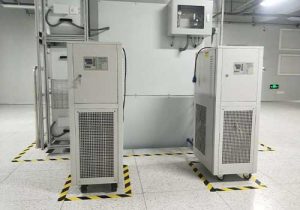water bath circulator heater
Introduction to Water Bath Circulator Heaters
Water bath circulator heaters are essential tools in scientific laboratories and industrial settings where precise temperature control is required. These devices maintain a consistent temperature by circulating water within a closed loop system, which can be heated or cooled depending on the application. They are designed to provide gentle and even heat transfer, similar to cooking, but with advanced technological integration for automatic temperature setting and maintenance.

Principles of Water Bath Circulator Heaters
The operation of a water bath circulator heater is based on the principle of heat transfer through a circulating fluid. The water, or other heat transfer fluid, is heated or cooled by an internal heating or cooling element and then circulated through the system to maintain a uniform temperature. This method avoids issues like convection, which can cause non-uniform bath temperatures and uneven heating in open systems.
Types of Water Bath Circulator Heaters
There are various types of water bath circulator heaters available, including:
Open Bath Circulators: Designed for internal applications within the circulator bath, these models are equipped with bath tanks made of polycarbonate or stainless steel.
Refrigerated and Heated Bath Circulators: These units can both heat and cool, providing a wide range of temperature control for various applications.

Advanced Programmable Circulators: Offering excellent precision, performance, and intuitive operation, these circulators are highly customizable.
Applications of Water Bath Circulator Heaters
Water bath circulator heaters are used in a variety of applications, such as:
Warming of Reagents and Culture Media: They ensure that reagents and culture media are maintained at the correct temperature for biological incubation and cell culture.
Thawing or Tempering Samples: These units are used to gently thaw or temper samples to prevent damage from rapid temperature changes.
Chemical Reactions: Many chemical reactions require precise temperature control, and water bath circulator heaters provide a stable environment for these processes.
Advantages of Water Bath Circulator Heaters
The advantages of using water bath circulator heaters include:
Precision Temperature Control: They offer high precision in temperature control, with some models achieving stability as precise as ±0.005°C.

Uniform Heat Transfer: Circulating the heated liquid creates more uniform heat transfer, reducing the risk of uneven heating.
Energy Efficiency: Many models are designed with energy-saving features, reducing operational costs and environmental impact.
Limitations of Water Bath Circulator Heaters
Despite their benefits, water bath circulator heaters have some limitations, such as:
Initial Investment: High-quality units can be expensive, requiring a significant initial investment.
Maintenance: Regular maintenance is required to ensure the unit operates efficiently and accurately.
Market Trends for Water Bath Circulator Heaters
The global market for water bath heaters is experiencing significant growth, driven by increasing demand across various sectors, including manufacturing, food processing, and pharmaceuticals. The market is expected to reach USD 1.2 billion by 2032, growing at a CAGR of 5.3%.
Conclusion
Water bath circulator heaters play a critical role in scientific research and industrial processes that require precise temperature control. As technology advances, these units are becoming more precise, efficient, and versatile. Understanding their principles, types, applications, advantages, and market trends is essential for selecting the appropriate unit for specific laboratory or industrial needs.
Related recommendations
spec chiller
328Defining Features of Spec ChillersSpec chillers are characterized by their adaptability to specific cooling demands. The core specifications that define these chillers include: Cooling Ca...
View detailsReasons why Industrial Chillers need to be Debugged
1442Reasons why Industrial Chillers need to be Debugged Industrial chiller is a kind of water cooling equipment that can provide constant temperature, constant pressure and constant flow. The pri...
View detailschiller supply
654Understanding Chiller Supply Chiller supply encompasses the systems and processes involved in delivering cooling solutions to industrial and commercial facilities. Chillers are essential for ma...
View detailsCharacteristics of Water Cooled Type Chiller
1487Characteristics of Water Cooled Type Chiller Refrigeration equipment is needed in all walks of life, and water-cooled chillers are one of them. The water-cooled chiller is small in size and...
View details
 LNEYA Chiller
LNEYA Chiller







HelloPlease log in